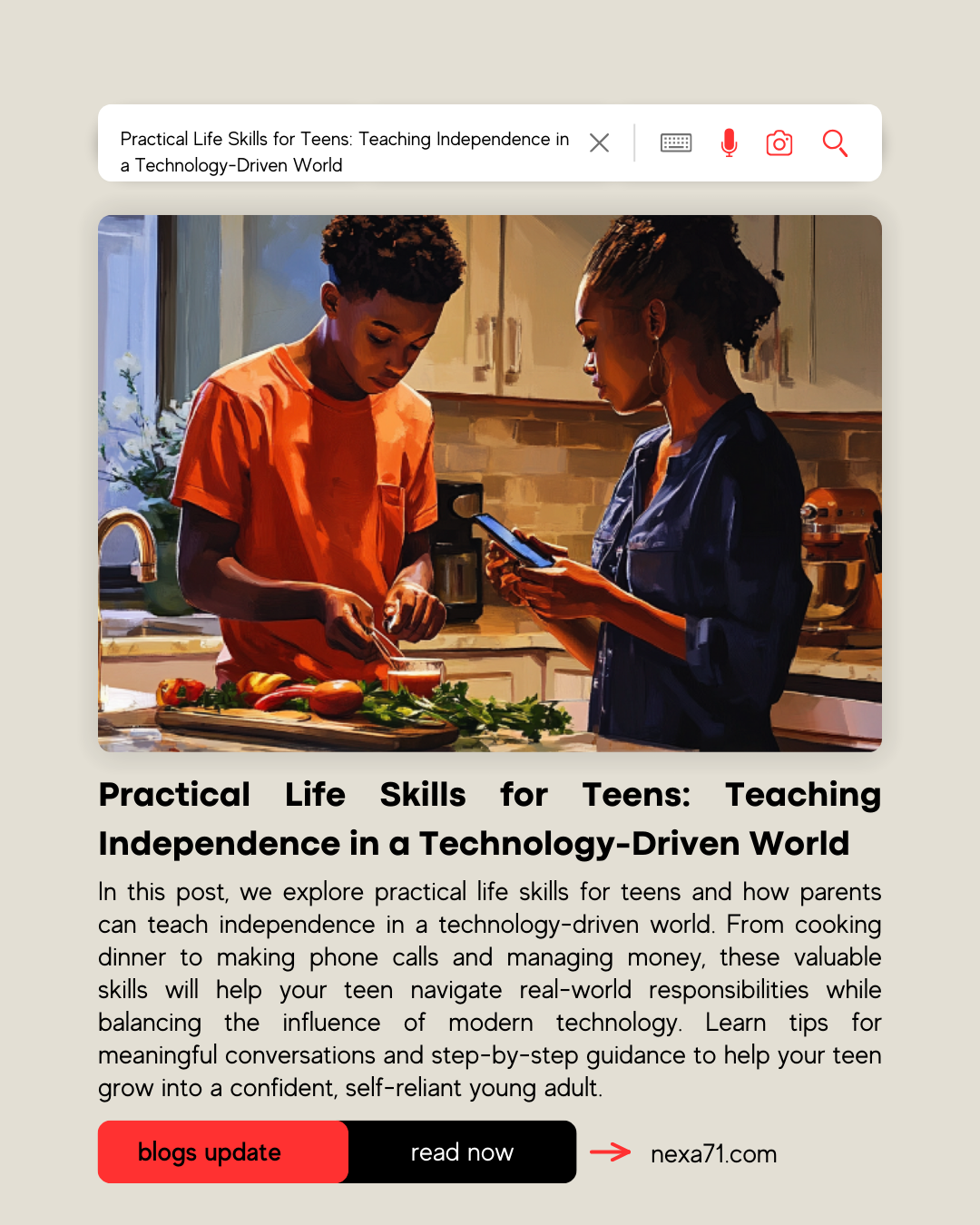Your cart is currently empty!

Practical Life Skills for Teens: Teaching Independence in a Technology-Driven World
As a mother of teens, I’ve noticed something that keeps coming up over and over, not just with my kids but with their friends too. It seems like some of the basic life skills we were taught when we were their age are not as commonly known today. Back in my day (yep, I said it), we didn’t have smartphones or the internet in our pockets. We had to learn how to make phone calls, cook, and have real conversations. Today, it feels like technology has swooped in and made some of these life skills less of a priority—or maybe the need to learn them isn’t as obvious to our teens.
But here’s the thing: those skills are still important. If anything, they’re more important now because they help kids become self-reliant and confident, even in this tech-driven world. So, if you’re like me and wondering how to help your teen learn these skills without sounding like a nagging parent, here are some tips that have worked for me (and hopefully they’ll work for you too).
1. The “Let’s Make Dinner Together” Conversation
I know it’s tempting to just cook dinner yourself because it’s quicker and less messy. But getting your teen involved in meal prep is a great way to teach them independence. Instead of saying, “You need to learn how to cook,” try, “Hey, how about we cook dinner together tonight? You pick the recipe.” This makes it feel less like a chore and more like a team effort. You’re teaching them how to feed themselves, but also showing them that cooking can be fun and rewarding.
When my kids started out, they would pick the simplest meals (because they knew that if they picked something complicated, I’d probably step in and do it). Now, they’re getting more adventurous, and honestly, it’s kind of cool to see how much pride they take in what they’ve made. They’re also learning about budgeting and nutrition along the way, especially when we talk about why I buy certain foods over others.
2. The “Fitness Isn’t Just for Instagram” Talk
A lot of teens are aware of fitness through social media—whether it’s influencers showing off their workout routines or body transformations. But sticking to a daily fitness plan that works for them is the real challenge. Instead of preaching about the importance of exercise, ask your teen what they enjoy doing. You’d be surprised—maybe they like boxing, hiking, or even yoga but just haven’t had the chance to try it. The key is helping them find something that feels more like a hobby than an obligation.
I started by asking, “Hey, do you want to try going on a walk with me after dinner?” or “Do you want to check out that new gym class together?” It’s about making fitness something that fits into their life, not a separate, boring thing they have to force themselves to do.
3. The “Babysitting Bootcamp” Chat
If you have younger kids or nieces and nephews, babysitting is a great way for teens to learn responsibility. But here’s the trick—don’t throw them into the deep end right away. Start small. Maybe you run out to the store while they watch their siblings for an hour. When you come back, praise them for how they handled things and talk about what they could improve on, like, “I noticed you did great when your brother was upset—how did you calm him down?”
I’ve found that making this an ongoing conversation helps build their confidence. And if they seem hesitant, try framing it as a job that could earn them extra money in the future. Nothing motivates teens like the promise of some cash!
4. The “Phone Calls Aren’t Scary” Conversation
I don’t know about you, but my teens have a serious aversion to making phone calls. And I get it—texting is easier, less awkward, and faster. But phone calls are still an important life skill, especially when it comes to things like making doctor’s appointments or calling about a job. I started by having my kids call in a pizza order or set up their own haircuts.
One of the things I’ve told them is, “You don’t have to know everything before you call. It’s okay to ask questions or take a moment to gather your thoughts.” This helps take some of the pressure off. And honestly, after a few times, they get the hang of it. Practice makes perfect, right?
5. The “Money Matters” Discussion
Teenagers and money—it’s an interesting combination. Whether it’s giving them a budget for groceries or helping them figure out how to save for something they want, teaching money management is crucial. Instead of lecturing about finances, try giving them some control. For example, “You have $30 to spend at the grocery store this week for snacks. How are you going to make it last?” This gives them the freedom to make decisions but also shows them the real-world impact of those decisions.
My kids have learned that buying name-brand snacks means they have less money to spend on other things and that sometimes, generics taste just as good!
6. The “Talking to Adults Isn’t Lame” Talk
Sometimes it feels like teens and adults are speaking completely different languages. But having real conversations with adults is a skill that will serve them well in job interviews, networking, and just everyday life. Instead of forcing the issue, I’ve found it’s helpful to invite my teens into conversations when we have family friends or relatives over. I’ll say something like, “Hey, why don’t you tell Aunt Sarah about your art project?”
It helps them get used to speaking with adults in a comfortable environment, and I always try to give positive feedback afterward, like “You explained that really well! Aunt Sarah was impressed.” The more they practice, the more natural it becomes.
7. The “Setting Goals Is Your Superpower” Conversation
This one can be tough because goal-setting often feels overwhelming to teens. What works for me is starting small. “What’s something you’d like to accomplish this month? It doesn’t have to be big—just something that would make you feel good about yourself.” Once they’ve picked a goal, help them break it down into steps. Whether it’s improving a grade or saving for a new gadget, the process of working toward something gives them a sense of purpose.
And here’s the kicker—celebrate their progress along the way! Whether it’s a quick “I see you’ve been studying more for that math test—awesome job!” or a small reward when they hit a milestone, it keeps them motivated.
8. The “It’s Okay to Be Bored” Chat
In today’s world, the idea of sitting in silence without a phone seems… well, foreign. But there’s value in learning how to be comfortable with quiet. I’ve tried introducing this by having “tech-free” times at home, whether it’s during meals or while we’re hanging out as a family. It can be tough at first (for all of us), but over time, I’ve noticed my kids getting more comfortable with just being—whether it’s reading a book, drawing, or simply daydreaming.
I try to explain to them that it’s okay to be bored sometimes. In fact, that’s often when the most creative ideas pop up. To help, I’ll suggest something like, “Instead of reaching for your phone, why don’t you try sketching something or writing in a journal?” It’s all about giving them alternatives to fill that silent space with something meaningful.
Conclusion
As parents, we have a huge role to play in teaching our teens these life skills. While technology has changed a lot of things for this generation, the basics of independence, responsibility, and real-world know-how are still the foundation they need to thrive. These conversations don’t have to be lectures—they can be part of your everyday interactions. With a little patience and a lot of encouragement, you’ll see your teens grow into self-sufficient young adults, ready to tackle whatever life throws at them.

Leave a Reply
You must be logged in to post a comment.